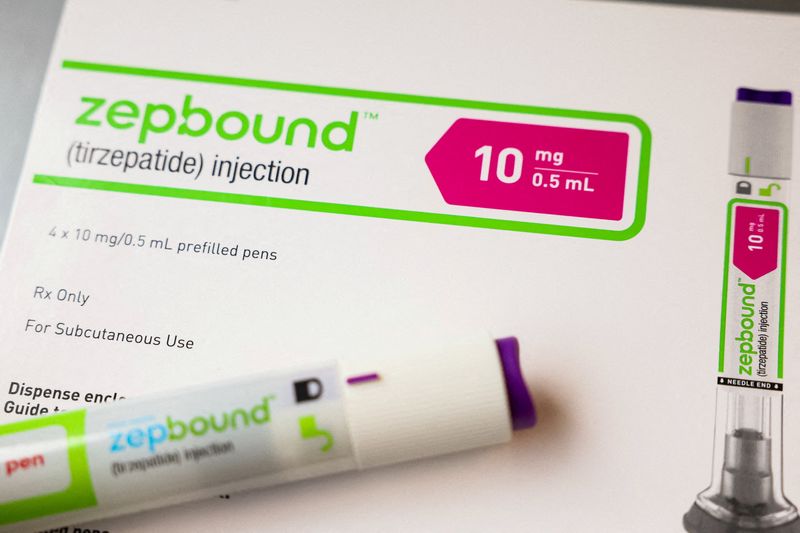Lilly launches smallest single-dose vials of Zepbound for $399
2024.08.27 09:10
By Patrick Wingrove
(Reuters) -Eli Lilly said it has begun selling vials of the smallest, starter dose of its popular weight-loss drug Zepbound in the United States for $399 for a month on its direct-to-consumer website to try to increase supplies in the marketplace.
Zepbound is typically sold in auto-injector pens, but with vials Lilly will eliminate that step and be able to get the drug to patients more quickly.
The 2.5-milligram and 5-mg vials – the lowest doses of the drug – will cost $399 and $549 for a month’s supply on its website LillyDirect, the company said. It has previously said patients could get the drug in a pen through LillyDirect for as little as $550.
Lilly said the prices were in line with its current offering and a 50% discount to the list prices of rivals, which includes Wegovy from Danish rival Novo Nordisk (NYSE:).
Lilly and Novo have been struggling to make enough of their obesity medications to meet soaring demand but in the last quarter, Lilly ramped up its manufacturing while Novo missed expectations. The company raised its sales forecast for the year by $3 billion.
Lilly’s medicines are now listed as available by the U.S. Food and Drug Administration, though they are not yet off the FDA’s official shortage list where they have been most of the year.
Citi analyst Daniel Grosslight said the move would alleviate the supply bottleneck around auto-injector pens. He said Lilly’s offering would take market share away from companies offering medications produced by compounding pharmacies, which is allowed in the U.S. when drugs are in shortage.
Shares of Hims and Hers Health fell 5.2% to $15.20 in premarket trading. The telehealth company offers compounded versions of Novo’s weight-loss drug.
The lowest dose of Novo’s Wegovy – which is used to start new patients – is still listed as in shortage.
Patrik Jonsson, Lilly’s president of cardiometabolic health, said in an interview that the launch of these vials will significantly increase supplies of Zepbound in the U.S.
“We are very confident with both the auto-injectors and the vials that we will be able to supply the needs in the U.S. marketplace,” he said, adding that a big chunk of patients do not progress to higher doses of Zepbound than 5 mg during treatment.

Around 86% of commercial healthcare plans cover obesity drugs, according to Lilly. Patients not covered for weight loss, such as those on the U.S. government’s Medicare health plan for older Americans, may otherwise have to pay more than $1,000 out of pocket for a month’s supply of Zepbound.
Lilly has already launched vials of the product in other countries, including Australia, Canada and Poland, Jonsson said.








